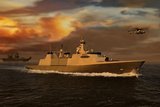DCNS to participate in NATO Ballistic Missile Defence
DCNS will participate in the NATO Ballistic Missile Defence system engineering and integration, as part of an industrial team led by Leidos, the company said in a press release issued on 6 March.
DCNS will be subject to a firm-fixed-price contract with a four-year base period of performance, two one-year extension options and an eight-month option. The total contract value is $77 million with all options exercised.
As part of its new role, DCNS will contribute to the specification, definition, integration and testing of NATO Ballistic Missile Defence architectures.
NATO aims to integrate its current and future national weapon systems, sensors, command and control systems with the NATO Battle Management Command Control Communications and Intelligence system. The industrial team will help achieve this by defining, specifying, testing and verifying architectures and requirements with an integration test bed.
Pierre Legros, senior vice president, programmes, DCNS, said: 'DCNS is the prime contractor for the FREMM frigates - the most technologically advanced combat ships on the market - two of which will be dedicated to air and missile defence for the French Navy, and for the Horizon Frigates Combat Management System maintenance.
'These frigates are strong candidates to contribute to the future NATO Ballistic Missile Defence architectures.'
The industrial team includes Leidos, Aselsan, Boeing, DCNS, Parsons, QinetiQ, RIMPAC, Thales and TMS.
More from Naval Warfare
-
![Spain’s F100 upgrade mirrors Aegis modernisation paths in allied navies]()
Spain’s F100 upgrade mirrors Aegis modernisation paths in allied navies
The Spanish Navy’s Alvaro de Bazan-class of air defence frigates will receive the latest Aegis Weapon System technology among other modernisations to extend the service life to 2045.
-
![UK’s Fleet Solid Support ship programme deemed on track despite steel supply concerns]()
UK’s Fleet Solid Support ship programme deemed on track despite steel supply concerns
Shipbuilders are saying the programme is going ahead on time as the government estimates 7.7 million tonnes of steel are needed for 2026 infrastructure projects.
-
![Raytheon unveils details of its proposal for the US Navy/NATO ESSM Next Significant Variant]()
Raytheon unveils details of its proposal for the US Navy/NATO ESSM Next Significant Variant
In an exclusive interview with Shephard, Raytheon’s VP of Shipboard Missiles disclosed what improvements the company plans to offer for the Sea Sparrow NSV.
-
![US Coast Guard Cutter Polar Star’s 50-year service highlights capability gaps in Antarctica]()
US Coast Guard Cutter Polar Star’s 50-year service highlights capability gaps in Antarctica
Delays in the construction of the Polar Security Cutter – the future substitute for the Polar Star – are likely to prolong the ageing icebreaker’s service time even more, putting the USCG in a risky position.
-
![As Indonesia doubles up its order, who else is looking at the Arrowhead 140 frigate design?]()
As Indonesia doubles up its order, who else is looking at the Arrowhead 140 frigate design?
The adaptable design of Babcock’s Arrowhead 140 frigate, already selected by the UK Royal Navy and Poland, has led to more orders from Indonesia while other countries continue to weigh it up.
-
![Does the increase in US firepower in the Middle East indicate another Iran strike?]()
Does the increase in US firepower in the Middle East indicate another Iran strike?
The presence of the USS Abraham Lincoln Carrier Strike Group in the Persian Gulf means additional naval and aerial capabilities, which provides the US with multiple attacking options.























